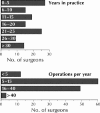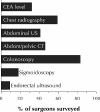The investigation of primary rectal cancer by surgeons: current pattern of practice
- PMID: 15757032
- PMCID: PMC3211575
The investigation of primary rectal cancer by surgeons: current pattern of practice
Abstract
Objective: Selection of the optimal treatment strategy for patients with rectal cancer requires appropriate investigation, but published guidelines provide no clear consensus. We examined the current practice pattern for the investigation of primary rectal cancer by general surgeons in the province of Ontario, Canada.
Methods: A telephone interview was completed by 124 surgeons in Ontario who manage patients with rectal cancer, who indicated the investigations they routinely perform in assessment before treatment. An exploratory cluster analysis was used to identify surgeon-related variables that predicted the pattern of investigation; these were tested in univariate and multivariate analyses.
Results: Cluster analysis identified 3 distinct groups of surgeons based on patterns of test usage. Univariate analysis showed that the use of chest radiography, computed tomography of the abdomen and pelvis, and ultrasound of the abdomen varied significantly with the surgeon's subspecialty training, practice location and years in practice. Regression analysis confirmed that each of these 3 variables independently predicted the pattern of preoperative investigation. There were no significant predictors of the use of colonoscopy, sigmoidoscopy or carcinoembryonic antigen level. Over half of surgeons reported that they would have ordered additional imaging tests but did not because of lack of availability. The perceived desirability of additional tests, endorectal ultrasound in particular, varied with training.
Conclusions: The current practice pattern for the preoperative investigation of primary rectal cancer by general surgeons varies significantly with specific surgeon-related variables, with potential impact on the management and outcome of patients with rectal cancer.
Objectif: La sélection de la stratégie optimale de traitement des patients atteints d'un cancer du rectum exige de procéder aux examens appropriés, mais les guides publiés ne présentent aucun consensus clair. Nous avons étudié la tendance actuelle de la pratique d'investigation du cancer primitif du rectum chez les chirurgiens généraux de la province de l'Ontario, au Canada.
Méthodes: Cent vingt-quatre chirurgiens de l'Ontario qui traitent des patients atteints d'un cancer du rectum ont participé à une entrevue téléphonique. Les chirurgiens ont indiqué les examens qu'ils effectuent de routine au cours de l'évaluation précédant le traitement. On a utilisé une analyse typologique exploratoire pour déterminer les variables reliées aux chirurgiens qui constituaient un prédicteur de la tendance des examens et on en a fait l'essai au cours d'analyses unidimensionnelle et multidimensionnelle.
Résultats: L'analyse typologique a dégagé trois groupes distincts de chirurgiens en fonction des tendances du recours aux examens. L'analyse unidimensionnelle a montré que l'utilisation de la radiographie pulmonaire, de la tomographie de l'abdomen et du bassin et de l'échographie de l'abdomen variait considérablement en fonction de la formation du chirurgien dans sa surspécialité, du lieu de pratique et du nombre d'années d'expérience. L'analyse de régression a confirmé que chacune de ces trois variables constituait un prédicteur indépendant de la tendance des examens préopératoires. Il n'y avait pas de prédicteur significatif de l'utilisation de la coloscopie, de la sigmoïdoscopie ou de la détermination de la concentration d'antigène carcinoembryonnaire. Plus de la moitié des chirurgiens ont indiqué qu'ils auraient recommandé d'autres examens d'imagerie mais qu'ils ne l'ont pas fait à cause de la non-disponibilité de ces examens. Le caractère souhaitable perçu d'examens supplémentaires, et de l'échographie endorectale en particulier, a varié en fonction de la formation.
Conclusions: La tendance actuelle de la pratique d'investigation préopératoire du cancer primitif du rectum chez les chirurgiens généraux varie considérablement en fonction de variables liées aux chirurgiens et peut avoir une incidence sur la prise en charge du cancer du rectum et sur l'évolution de l'état de santé des patients.
Figures



Comment in
-
Appropriate preoperative investigations in the management of rectal cancer.Can J Surg. 2005 Feb;48(1):9-10. Can J Surg. 2005. PMID: 15757029 Free PMC article. No abstract available.
Similar articles
-
Management of primary rectal cancer by surgeons in Atlantic Canada: results of a regional survey.Can J Surg. 2010 Dec;53(6):396-402. Can J Surg. 2010. PMID: 21092432 Free PMC article.
-
How Is Rectal Cancer Managed: a Survey Exploring Current Practice Patterns in Canada.J Gastrointest Cancer. 2019 Jun;50(2):260-268. doi: 10.1007/s12029-018-0064-9. J Gastrointest Cancer. 2019. PMID: 29388060
-
How do we manage early rectal cancer? A national questionnaire survey among members of the ACPGBI after the preliminary results of the MRC CR07/NCIC CO16 randomized trial.Colorectal Dis. 2008 May;10(4):357-62. doi: 10.1111/j.1463-1318.2007.01366.x. Epub 2007 Aug 31. Colorectal Dis. 2008. PMID: 17764532
-
Preoperative imaging staging of rectal cancer.Dig Dis. 2007;25(1):20-32. doi: 10.1159/000099167. Dig Dis. 2007. PMID: 17384505 Review.
-
National and international guidelines for rectal cancer.Colorectal Dis. 2014 Nov;16(11):854-65. doi: 10.1111/codi.12678. Colorectal Dis. 2014. PMID: 24888694 Review.
Cited by
-
Endoscopic Localization of Colon Cancer Is Frequently Inaccurate.Dig Dis Sci. 2017 Aug;62(8):2120-2125. doi: 10.1007/s10620-017-4591-1. Epub 2017 May 2. Dig Dis Sci. 2017. PMID: 28466261
-
Management of the adenocarcinoma of the upper rectum: a reappraisal.Updates Surg. 2021 Apr;73(2):513-526. doi: 10.1007/s13304-020-00903-6. Epub 2020 Oct 27. Updates Surg. 2021. PMID: 33108641 Review.
-
Management of primary rectal cancer by surgeons in Atlantic Canada: results of a regional survey.Can J Surg. 2010 Dec;53(6):396-402. Can J Surg. 2010. PMID: 21092432 Free PMC article.
-
Factors associated with use of preoperative chemoradiation therapy for rectal cancer in the Cancer Care Outcomes Research and Surveillance Consortium.Am J Clin Oncol. 2013 Dec;36(6):572-9. doi: 10.1097/COC.0b013e318261082b. Am J Clin Oncol. 2013. PMID: 22992624 Free PMC article.
-
Definition of the rectum and level of the peritoneal reflection - still a matter of debate?Wideochir Inne Tech Maloinwazyjne. 2013 Sep;8(3):183-6. doi: 10.5114/wiitm.2011.34205. Epub 2013 Mar 26. Wideochir Inne Tech Maloinwazyjne. 2013. PMID: 24130630 Free PMC article. Review.
References
-
- American Cancer Society: Cancer Statistics. Available: www.cancer.org/docroot/STT/stt_0.asp (accessed 2005 Jan 25).
-
- Canadian Cancer Society. Canadian cancer statistics. Available: www.ncic.cancer.ca/ncic/internet/standard/0,3621,84658243_328386486__lan... (accessed 2005 Jan 25).
-
- Midgley R, Kerr D. Colorectal cancer. Lancet 1999;353:391-9. - PubMed
-
- Heald RJ, Ryall RD. Recurrence and survival after total mesorectal excision for rectal cancer. Lancet 1986;331:1482-9. - PubMed
-
- Macfarlane JK, Ryall RD, Heald RJ. Mesorectal excision for rectal cancer. Lancet 1993;341:457-60. - PubMed
Publication types
MeSH terms
Substances
LinkOut - more resources
Full Text Sources
